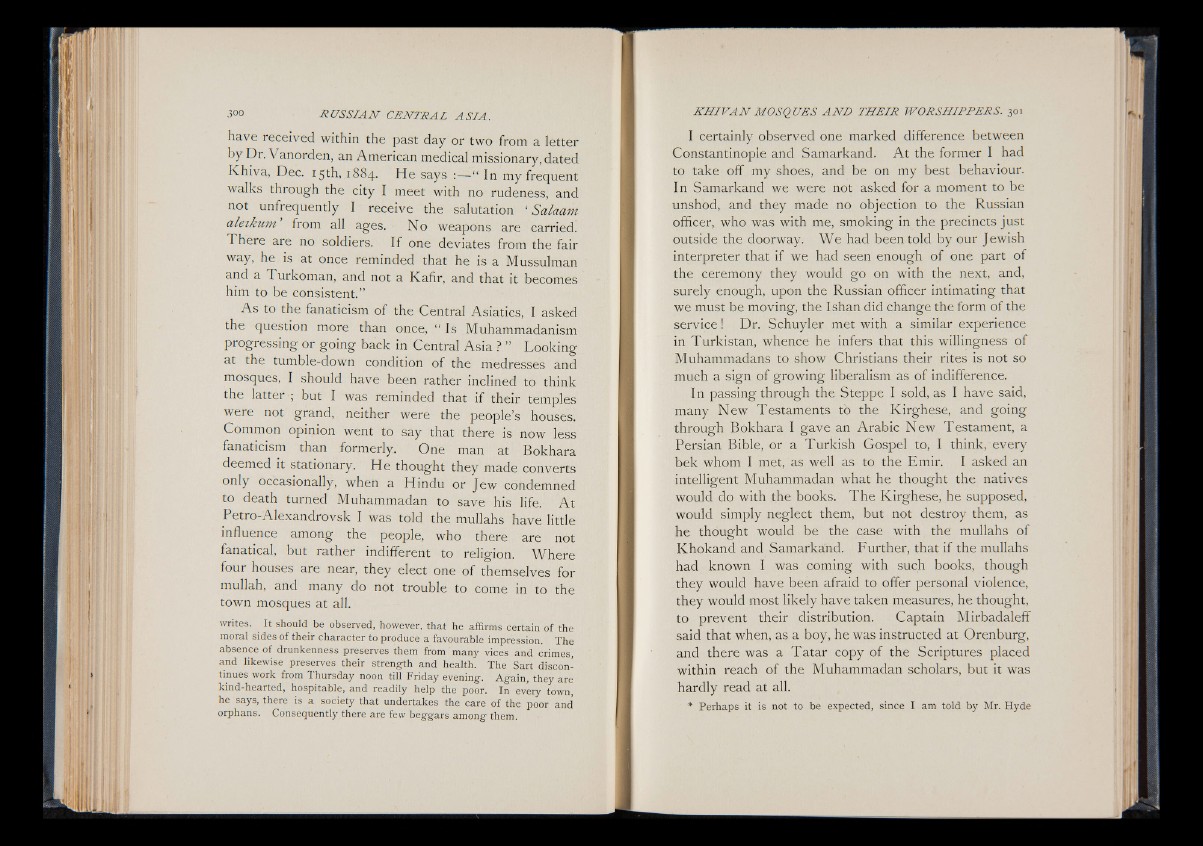
have received within the past day or two from a letter
by Dr. Vanorden, an American medical missionary, dated
Khiva, Dec. 15th, 1884. He says :— “ In my frequent
walks through the city I meet with no rudeness, and
not unfrequently I receive the salutation ‘ Salaam
aletkum from all ages. No weapons are carried.
There are no soldiers. I f one deviates from the fair
way, he is at once reminded that he is a Mussulman
and a Turkoman, and not a Kafir, and that it becomes
him to be consistent.”
A s to the fanaticism of the Central Asiatics, I asked
the question more than once, “ Is Muhammadanism
progressing or going back in Central Asia ? ” Looking
at the tumble-down condition of the medresses and
mosques, I should have been rather inclined to think
the latter ; but I was reminded that if their temples
were not grand, neither were the people’s houses.
Common opinion went to say that there is now less
fanaticism than formerly. One man at Bokhara
deemed it stationary. He thought they made converts
only occasionally, when a Hindu or Jew condemned
to death turned Muhammadan to save his life. A t
Petro-Alexandrovsk I was told the mullahs have little
influence among the people, who there are not
fanatical, but rather indifferent to religion. Where
four houses are near, they elect one of themselves for
mullah, and many do not trouble to come in to the
town mosques at all.
writes. It should be observed, however, that he affirms certain of the
moral sides of their character to produce a favourable impression. The
absence of drunkenness preserves them from many vices and crimes,
and likewise preserves their strength and health. The Sart discontinues
work from Thursday noon till Friday evening. Again, they are
kind-hearted, hospitable, and readily help the poor. In every town,
he says, there is a society that undertakes the care of the poor and
orphans. Consequently there are few beggars among them.
I certainly observed one marked difference between
Constantinople and Samarkand. A t the former I had
to take off my shoes, and be on my best behaviour.
In Samarkand we were not asked for a moment to be
unshod, and they made no objection to the Russian
officer, who was with me, smoking in the precincts just
outside the doorway. We had been told by our Jewish
interpreter that if we had seen enough of one part of
the ceremony they would go on with the next, and,
surely enough, upon the Russian officer intimating that
we must be moving, the Ishan did change the form of the
service! Dr. Schuyler met with a similar experience
in Turkistan, whence he infers that this willingness of
Muhammadans to show Christians their rites is not so
much a sign of growing liberalism as of indifference.
In passing through the Steppe I sold, as I have said,
many New Testaments to the Kirghese, and going
through Bokhara I gave an Arabic New Testament, a
Persian Bible, or a Turkish Gospel to, I think, every
bek whom I met, as well as to the Emir. I asked an
intelligent Muhammadan what he thought the natives
would do with the books. The Kirghese, he supposed,
would simply neglect them, but not destroy them, as
he thought would be the case with the mullahs of
Khokand and Samarkand. Further, that if the mullahs
had known I was coming with such books, though
they would have been afraid to offer personal violence,
they would most likely have taken measures, he thought,
to prevent their distribution. Captain Mirbadaleff
said that when, as a boy, he was instructed at Orenburg,
and there was a Tatar copy of the Scriptures placed
within reach of the Muhammadan scholars, but it was
hardly read at all.
* Perhaps it is not to be expected, since I am told by Mr. Hyde